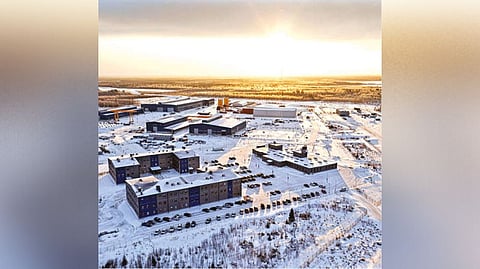

The pinched cylinders of Russian-built nuclear power plants that dot Europe’s landscape are visible reminders of the crucial role that Russia still plays in the continent’s energy supply. Europe moved with startling speed to wean itself off Russian oil and natural gas in the wake of war in Ukraine. But breaking the long-standing dependency on Russia’s vast nuclear industry is a much more complicated undertaking.
Russia, through its mammoth state-owned nuclear power company, Rosatom, dominates the global nuclear supply chain. It was Europe’s third-largest supplier of uranium in 2021, accounting for 20% of the total. With few ready alternatives, there has been scant support for sanctions against Rosatom — despite urging from the Ukrainian government in Kyiv. For countries with Russian-made reactors, reliance runs deep. In five European Union countries, every reactor — 18 in total — were built by Russia. In addition, two more are scheduled to start operating soon in Slovakia, and two are under construction in Hungary, cementing partnerships with Rosatom far into the future. For years, the operators of these nuclear power plants had little choice. Rosatom, through its subsidiary TVEL, was virtually the only producer of the fabricated fuel assemblies — the last step in the process of turning uranium into the nuclear fuel rods — that power the reactors. Since the invasion of Ukraine in February 2022, some European countries have started to step away from Russia’s nuclear energy superstore.
The Czech Republic’s energy company, CEZ, has signed contracts with Pennsylvania-based Westinghouse Electric Co. and the French company Framatome to supply fuel assemblies for its plant in Temelin. Finland canceled a troubled project with Rosatom to build a nuclear reactor and hired Westinghouse to design, license and supply a new fuel type for its plant in Loviisa after its current contracts expire. “The purpose is to diversify the supply chain,” said Simon-Erik Ollus, an executive vice president at Fortum, a Finnish energy company.
Bulgaria signed a new 10-year agreement with Westinghouse to provide fuel for its existing reactors. And last week, it moved ahead with plans for the American company to build new nuclear reactor units. Poland is about to construct its first nuclear power plant, which will feature three Westinghouse reactors.
Slovakia and even Hungary, Russia’s closest ally in the European Union, have also reached out to alternative fuel suppliers. “We see a lot of genuine movement,” said Tarik Choho, president of nuclear fuel unit at Westinghouse, adding that the Ukraine war accelerated Europe’s search for new suppliers. “Even Hungary wants to diversify.”
William Freebairn, senior managing editor for nuclear energy at S&P Commodity Insights, said Russia’s march into Ukraine last year in some ways marked “a sea change.”
“Within days of the invasion,” he said, “just about every country that operated a Russian reactor started looking for alternate supply.”
In Ukraine, serious efforts to chip away at Russian nuclear dominance began in 2014 after President Vladimir Putin of Russia sent troops to occupy territory in Crimea and the eastern Donbas region. Ukraine, whose 15 Soviet-era reactors provided half the country’s electricity, signed a deal with Westinghouse to expand its fuel contract. It took roughly five years between the start of the design process and the final delivery of the first fuel assembly, according to the International Energy Association.
Cohen is a journalist with NYT©2023
The New York Times
Visit news.dtnext.in to explore our interactive epaper!
Download the DT Next app for more exciting features!
Click here for iOS
Click here for Android